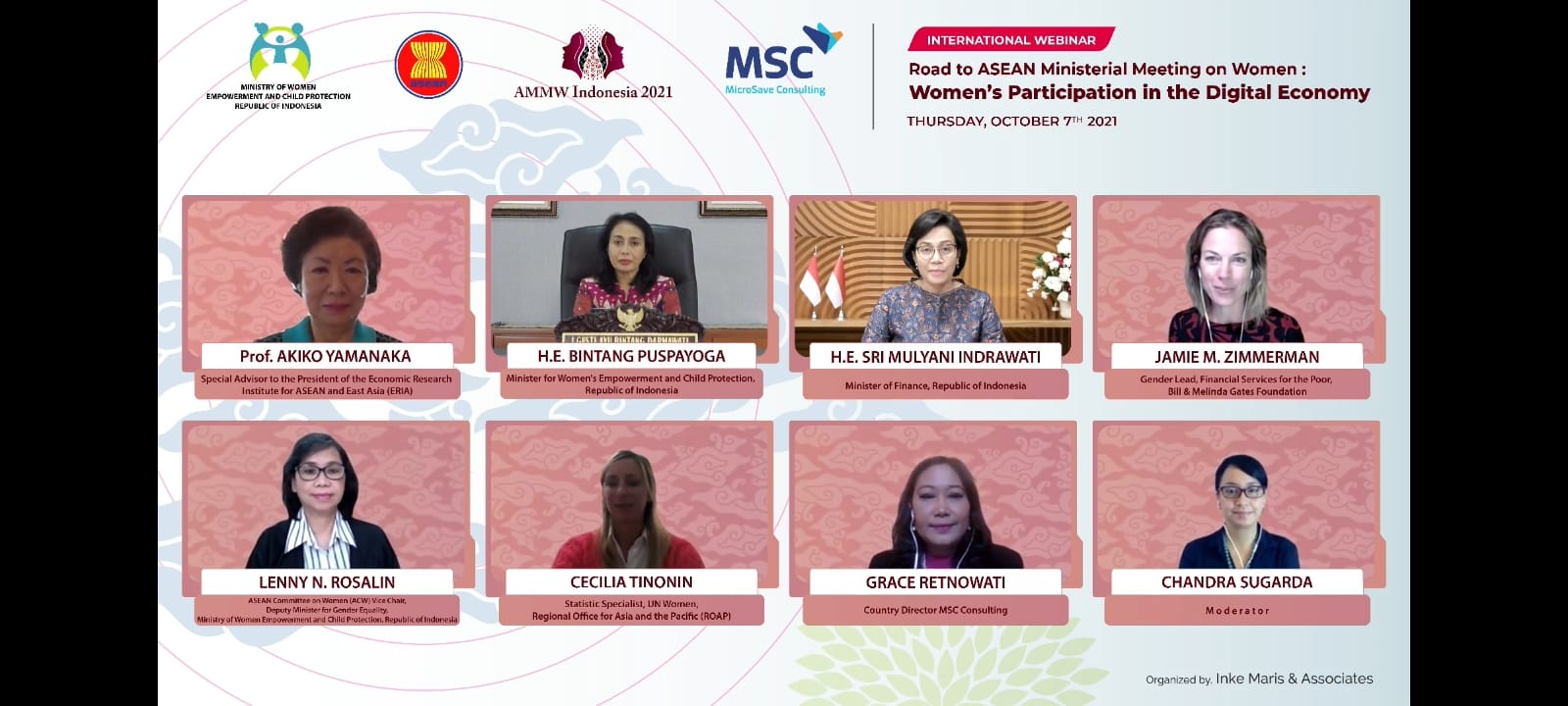Inclusive Digital Economy Emphasized during the ASEAN Ministerial Meeting on Women Policy Dialogue
Date:
7 October 2021Category:
NewsTopics:
Digital Economy, Women ParticipationShare Article:
Print Article:
Jakarta, 7 October 2021: Women across ASEAN need increased and equal access to better skills, entrepreneurship opportunities, and leadership positions during this period of rapid acceleration of the digital economy. Going forward, the region must narrow the digital gender divide and work towards creating inclusive digital economies that also prepare female workers for an increasingly tech-savvy labour market. The Economic Research Institute for ASEAN and East Asia (ERIA) participated in the webinar on Women’s Participation in the Digital Economy, represented by Professor Akiko Yamanaka, Special Adviser to the President of ERIA and Former Vice Minister of Foreign Affairs Japan and Special Ambassador for Peacebuilding of Japan.
The ‘Webinar on Women’s Participation in the Digital Economy’ initiated discussions on women’s empowerment in ASEAN and inclusive economic growth. The webinar was a pre-Ministerial event organised by the government of Indonesia as part of the Fourth ASEAN Ministerial Meeting on Women (AMMW) scheduled for 11 – 15 October 2021. Organised by the Ministry of Women’s Empowerment and Child Protection, Indonesia and in collaboration with MicroSave Consulting, the event supported the ASEAN Committee on Women (ACW) – Indonesia’s action plan focused on women’s economic empowerment and achieving inclusive economic growth in ASEAN through financial inclusion and digitalisation.
Prof Yamanaka shared evidence and insights from recent ERIA research regarding women’s participation in the digital economy in ASEAN. She also participated in a panel discussion on the impact of the COVID-19 pandemic on women across the ASEAN region. During the panel discussion, she explained that the majority of female entrepreneurs across ASEAN lead micro, small, and medium enterprises that are less likely to rely on advanced digital technology. Prof Yamanaka’s policy recommendations include strengthening the role of women in ASEAN’s digital economy which includes cyber-violence and gender discrimination prevention, incorporating gender balance principles in post-pandemic policy programmes, and promoting equal participation in business environments.
The Minister for Women’s Empowerment and Child Protection, Indonesia H.E. Ms Bintang Puspayoga delivered her Keynote Speech highlighting the need to determine national strategies that support women and to provide women with better digital access. Enhancing access to the internet is of particular importance for Indonesia’s continued growth as it is ASEAN’s most populous member state and where over half of its women are in their productive years. H.E. Ms Puspayoga shared Indonesia’s commitment to supporting women’s economic empowerment by encouraging more women to be involved in entrepreneurial activities at the provincial level, reducing violence against women and children, eliminating child labour, and preventing child marriages. To achieve these objectives, the Indonesian government has applied a gender lens in its national financial inclusion strategy and as such, advocates women-led enterprises by offering low-interest loans and capacity building activities that promote digital skills.
Minister of Finance, Indonesia H.E. Ms Sri Mulyani Indrawati centred her Keynote Speech on achieving digital transformation to meet the UN’s Sustainable Development Goal (SDG) Five concerning gender equality and women’s empowerment. H.E. Ms Indrawati believes that digital technology and digital financial services can narrow the urban-rural divide. It can also advance female participation in economic activities and improve the livelihoods of every woman. Indonesia has continued to implement policies and that support gender equality as evidenced by its ‘Ultra-Micro’ (Umi) national programme which mostly supports women-led businesses.
To reap the benefits of inclusive economic growth, H.E. Ms Indrawati shared four factors that must be addressed to foster financial inclusion and to increase the role of women in the digital economy: (1) Offer financial products and services that are accessible for women, (2) Provide online education on finance and financial literacy for women, (3) Establish a regulatory and policy framework that mandates equal treatment for men and women, and 4) Ensure adequate information and communication technology infrastructure in urban and rural areas. H.E. Ms Indrawati closed her remarks by encouraging greater participation from the public and private sectors to tackle the multiple barriers to achieving gender equality.
Other notable speakers included Ms Jamie M. Zimmerman, Gender Lead, Financial Services for the Poor Global Growth and Opportunity from the Bill and Melinda Gates Foundation; Ms Lenny N. Rosalin, ACW Vice-Chair Deputy Minister for Gender Equality, Minister of Women Empowerment and Child Protection, Indonesia; Ms Cecilia Titonin, Statistic Specialist, UN Women Regional Office for Asia and the Pacific; and Ms Chandra Sugarda, Gender and Public Finance Expert moderated the discussions. Country Director of MicroSave Consulting Ms Grace Retnowati gave the Closing Remarks of the webinar.








